If you’re a horse owner you may have found out the hard way at some point that if a protruding nail or other hazard is in the pasture, your horse will find it. If you haven’t experienced lacerations in horses, or even if you have in the past, there are some things you should know.
It’s alarming, but it’s important to stay calm and follow some procedures to keep the wound under control until the veterinarian can get there. You may even be able to see fat, cartilage, muscle, or bone, and there may be some swelling. While it’s true that even the worst wounds can heal without drawbacks if managed right away, you are instrumental in their healing.
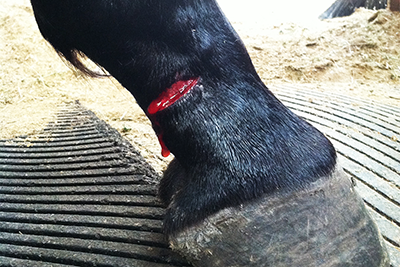
If there are only abrasions, you can use a cold hose to flush the area with diluted Betadine and clean the wound with disinfectants. Do not scrub or rub it because it can make it worse. CALL US right away if you are not comfortable handling any wound on your own. For large lacerations, we can determine through an assessment of the wound if critical structures are affected. We’ll decide if stitches are needed and whether any dead or damaged tissue needs to be removed to help the healing process. For more severe wounds, splints may be placed to provide support. If there is a rupture of tendons, that will require a different kind of splint, so it’s necessary for the veterinarian to make that judgment call.
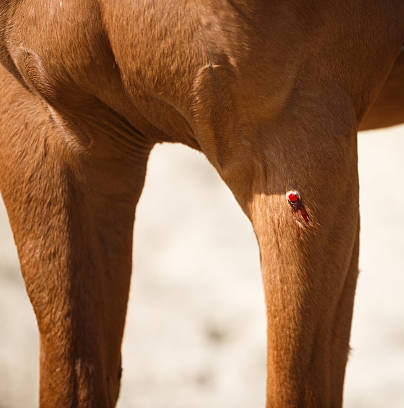
While you wait for the vet to arrive, you’ll want to staunch bleeding and keep your horse as calm and comfortable as possible.
– Apply direct pressure to stop any bleeding. Use a CLEAN cloth – bandages are best, but even your shirt, or you can use a saddle pad. You’ll want to hold it gently but firmly and don’t stop while the bleeding continues.
– If the fabric becomes soaked with blood, add another cloth over the one you have in place. You can use bandages to hold the fabric in place if you need to.
– If it’s safe for him to move, get him to a quiet, well-lit area with access to running water. Do not move him if you can’t control the bleeding, or you suspect greater damage like ligament, tendon, or bone injuries. If he doesn’t want to move, respect that and allow him to stay where he is until we get there.
– Keep him calm and if he has a quiet buddy to stand nearby, that may help settle him down if he’s anxious.
– If the wound was pulsating and spurting, skip this next step because there may be an artery involved. You don’t want to aggravate that and start the bleeding again. If that is not the case, flush the wound with a gentle rinse from the hose, but only when the bleeding has slowed. Try to remove any dirt or debris. DO NOT use a high-pressure spray attachment because you could do the opposite and force debris deeper into the wound.
– Check for any splinters or other objects that might slow his healing, but do not attempt to remove those on your own. The veterinarian will need to evaluate how deep those are.
– Don’t neglect to check him for other injuries when the bleeding is under control.
Don’t assume that more complicated wounds will heal on their own. Call the vet sooner rather than later, or you may face bacterial growth in as little as eight hours. Bacteria can cause other serious problems and infections. The size of the wound will affect how well it will heal. Underestimating this is a mistake. Some trauma may cause bruising that may complicate healing. Determining whether the cut is from a sharp or jagged object will be important because of the complexity of the injury.
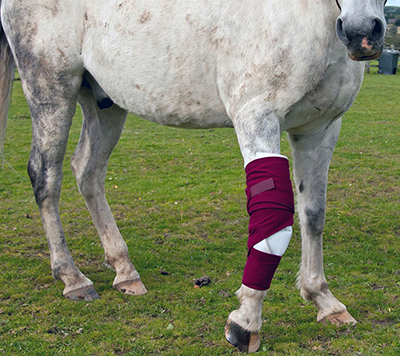
Lower leg wounds can be life-threatening if important structures become contaminated. Similarly, wounds to the head, neck, and abdomen can be serious if vital structures are disrupted or infection sets in. Our vet will work to determine if vital structures are affected and make the best treatment plan for your horse. Keep in mind that some wounds may be severe enough to require advanced imaging and surgery at a referral center.
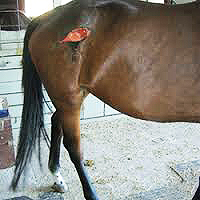
Lacerations in horses are scary, so call us right away at 865-566-8359. Established clients in good standing have access to 24/7 emergency care. Even if it’s in the middle of the night, we are here for you. Not an established client? We serve many areas in East Tennessee. We would love to provide elite medical care for your horses.
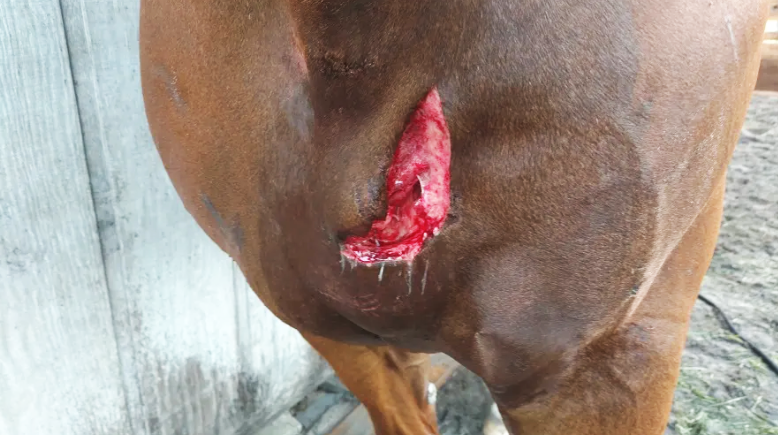
Leave a Reply